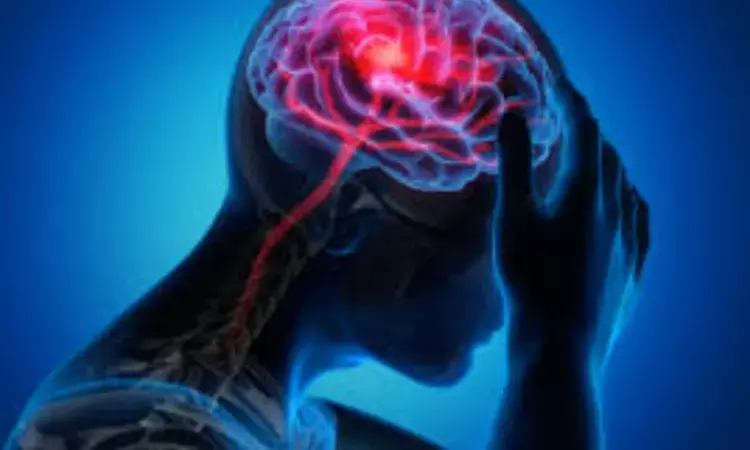- Home
- Medical news & Guidelines
- Anesthesiology
- Cardiology and CTVS
- Critical Care
- Dentistry
- Dermatology
- Diabetes and Endocrinology
- ENT
- Gastroenterology
- Medicine
- Nephrology
- Neurology
- Obstretics-Gynaecology
- Oncology
- Ophthalmology
- Orthopaedics
- Pediatrics-Neonatology
- Psychiatry
- Pulmonology
- Radiology
- Surgery
- Urology
- Laboratory Medicine
- Diet
- Nursing
- Paramedical
- Physiotherapy
- Health news
- Fact Check
- Bone Health Fact Check
- Brain Health Fact Check
- Cancer Related Fact Check
- Child Care Fact Check
- Dental and oral health fact check
- Diabetes and metabolic health fact check
- Diet and Nutrition Fact Check
- Eye and ENT Care Fact Check
- Fitness fact check
- Gut health fact check
- Heart health fact check
- Kidney health fact check
- Medical education fact check
- Men's health fact check
- Respiratory fact check
- Skin and hair care fact check
- Vaccine and Immunization fact check
- Women's health fact check
- AYUSH
- State News
- Andaman and Nicobar Islands
- Andhra Pradesh
- Arunachal Pradesh
- Assam
- Bihar
- Chandigarh
- Chattisgarh
- Dadra and Nagar Haveli
- Daman and Diu
- Delhi
- Goa
- Gujarat
- Haryana
- Himachal Pradesh
- Jammu & Kashmir
- Jharkhand
- Karnataka
- Kerala
- Ladakh
- Lakshadweep
- Madhya Pradesh
- Maharashtra
- Manipur
- Meghalaya
- Mizoram
- Nagaland
- Odisha
- Puducherry
- Punjab
- Rajasthan
- Sikkim
- Tamil Nadu
- Telangana
- Tripura
- Uttar Pradesh
- Uttrakhand
- West Bengal
- Medical Education
- Industry
OPTIMAS Trial Challenges Guidelines: Early Anticoagulation Safe After Ischemic Stroke in Atrial Fibrillation

UK: In a recent study known as OPTIMAS, researchers have found that initiating direct oral anticoagulants (DOACs) within four days of an ischaemic stroke associated with atrial fibrillation is as safe as delaying treatment. The findings were published online in The Lancet.
This multicentre, phase 4, randomised controlled trial involving blinded endpoints revealed that starting DOAC therapy within four days following an ischemic stroke related to atrial fibrillation (AF) showed comparable safety to delayed initiation, with no significant difference in the composite outcomes of ischemic stroke, intracranial hemorrhage, unclassifiable stroke, or systemic embolism at 90 days.
Traditionally, guidelines have recommended postponing the initiation of anticoagulation therapy following an ischaemic stroke. This cautious approach aims to mitigate the risks of potential complications, such as further strokes or intracranial hemorrhages.
"Our findings challenge the widely accepted practice and guidelines that recommend delaying DOAC initiation following an ischemic stroke in patients with atrial fibrillation," the researchers wrote.
Prof David J Werring, University College London Queen Square Institute of Neurology, London, UK, and colleagues examined the efficacy and safety of starting DOACs early versus delaying their initiation in patients experiencing acute ischemic stroke related to AF.
For this purpose, the researchers conducted a multicentre, open-label, blinded-endpoint, parallel-group, phase 4 randomized controlled trial at 100 UK hospitals. Adults with atrial fibrillation and a clinical diagnosis of acute ischemic stroke, whose physicians were uncertain about the timing of DOAC initiation, were included. Participants were randomly assigned (1:1) to receive anticoagulation either early (≤4 days post-stroke) or delayed (7–14 days).
While participants and clinicians were aware of treatment assignments, outcomes were adjudicated by a masked independent committee reviewing clinical records and imaging reports. The primary outcome measured was a composite of recurrent ischemic stroke, symptomatic intracranial hemorrhage, unclassifiable stroke, or systemic embolism within 90 days in a modified intention-to-treat population. The study employed a gatekeeper approach for sequential testing of a non-inferiority margin of 2 percentage points, followed by superiority testing.
The following were the key findings of the study:
- Between July 5, 2019, and January 31, 2024, 3,648 patients were randomly assigned to either early or delayed initiation of DOACs.
- After excluding 27 participants who did not meet eligibility criteria or withdrew consent, 3,621 patients were included in the modified intention-to-treat analysis (1,814 in the early group and 1,807 in the delayed group; 1,981 men and 1,640 women).
- The primary outcome occurred in 3.3% of participants in both the early and delayed groups (adjusted risk difference [RD] 0.000).
- The upper limit of the 95% CI for the adjusted RD was below the non-inferiority margin of 2 percentage points, but superiority was not demonstrated.
- Regarding symptomatic intracranial hemorrhage, 0.6% in the early group experienced this outcome, compared to 0.7% in the delayed group (adjusted RD 0.001).
The OPTIMAS trial has demonstrated that early initiation of direct oral anticoagulants after ischemic stroke associated with AF is non-inferior to delayed initiation regarding the composite outcomes of ischemic stroke, intracranial hemorrhage, unclassifiable stroke, or systemic embolism within 90 days. There was no increase in the risk of intracranial hemorrhage, nor was there a reduction in the risk of recurrent ischemic stroke.
"These findings challenge current guidelines that recommend delaying DOAC initiation due to concerns about early intracranial hemorrhage, especially in patients with moderate to severe strokes," the researchers concluded.
Reference: https://www.thelancet.com/journals/lancet/article/PIIS0140-6736(24)02197-4/fulltext
Dr Kamal Kant Kohli-MBBS, DTCD- a chest specialist with more than 30 years of practice and a flair for writing clinical articles, Dr Kamal Kant Kohli joined Medical Dialogues as a Chief Editor of Medical News. Besides writing articles, as an editor, he proofreads and verifies all the medical content published on Medical Dialogues including those coming from journals, studies,medical conferences,guidelines etc. Email: drkohli@medicaldialogues.in. Contact no. 011-43720751


